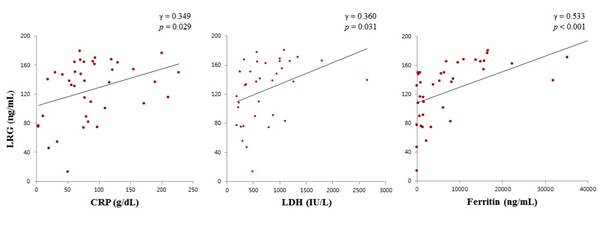Session Information
Session Type: Abstract Submissions (ACR)
Background/Purpose: Leucine-rich a2-glycoprotein (LRG) is a plasma protein which contains leucine-rich repeats. Though physiological functions of LRG have not been clarified yet, it has been reported that LRG could be a marker of granulocytic differentiation and its expression was up-regulated during neutrophil differentiation. Serum LRG levels were significantly elevated in some chronic inflammatory diseases such as ulcerative colitis and rheumatoid arthritis. However, there are no studies about the association between serum LRG level and disease activity and severity in patients with adult-onset Still’s disease (AOSD). This study aimed to investigate whether the serum LRG level is elevated in AOSD patients and its correlation with disease activity and severity.
Methods: We enrolled 39 patients with AOSD and 39 age- and sex- matched healthy controls. Forty-five serum samples were obtained from patients with AOSD during active or inactive disease and were assayed for LRG by enzyme-linked immunosorbent assay (ELISA). Clinical and laboratory data related to disease activity were collected at the same time. Disease severity was determined by modified Pouchot’s score.
Results: Serum LRG concentrations were significantly elevated in AOSD patients compared with healthy control (126.2 ± 40.9 ng/mL vs 22.4 ± 6.2 ng/mL, p < 0.001). Patients with active AOSD had a significantly higher LRG level than those with inactive disease (132.9 ± 34.6 ng/mL vs 67.1 ± 50.2 ng/mL, p = 0.009). Serum LRG showed modest correlation with C-reactive protein (g = 0.349, p = 0.029), serum lactate dehydrogenase (g = 0.360, p = 0.031) and ferritin (g = 0.533, p < 0.001), but not with white blood cell counts or erythrocyte sedimentation rate. Serum LRG did not show correlation with AOSD systemic scores, reflecting disease severity. Serum LRG levels decreased significantly after treatment in all 6 active patients with AOSD who had follow-up evaluations (p = 0.007).
Conclusion: Serum LRG levels were increased in patients with AOSD and well correlated with disease activity measures. These findings suggest that plasma LRG may be a useful serologic marker for monitoring disease activity of AOSD.
Disclosure:
Y. J. Ha,
None;
J. S. Song,
None;
E. J. Kang,
None;
S. W. Lee,
None;
Y. B. Park,
None;
S. K. Lee,
None;
S. T. Choi,
None.
« Back to 2013 ACR/ARHP Annual Meeting
ACR Meeting Abstracts - https://acrabstracts.org/abstract/serum-leucine-rich-alpha-2-glycoprotein-as-a-marker-for-disease-activity-in-adult-onset-stills-disease/

